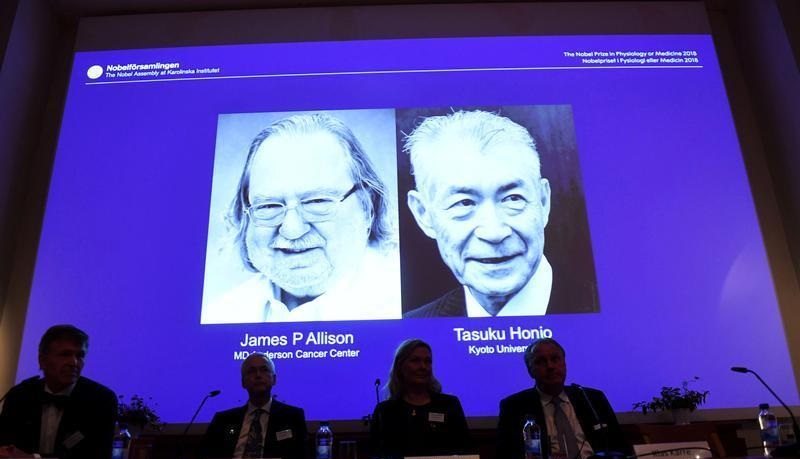Scientists behind game-changing cancer immunotherapies win Nobel medicine prize (UPDATE 3)

American James Allison and Japanese Tasuku Honjo won the 2018 Nobel Prize for Physiology or Medicine on Monday for game-changing discoveries about how to harness and manipulate the immune system to fight cancer.
The scientists' work in the 1990s has since swiftly led to new and dramatically improved therapies for cancers such as melanoma and lung cancer, which had previously been extremely difficult to treat.
"The seminal discoveries by the two Laureates constitute a landmark in our fight against cancer," the Nobel Assembly at Sweden's Karolinska Institute said as it awarded the prize of nine million Swedish crowns ($1 million).
Allison and Honjo "showed how different strategies for inhibiting the brakes on the immune system can be used in the treatment of cancer," it said, adding that resulting treatments, known as immune checkpoint blockade, have "fundamentally changed the outcome" for some advanced cancer patients.
Medicine is the first of the Nobel Prizes awarded each year. The prizes for achievements in science, literature and peace were created in accordance with the will of dynamite inventor and businessman Alfred Nobel and have been awarded since 1901.
The literature prize will not be handed out this year after the awarding body was hit by a sexual misconduct scandal. A Swedish court on Monday found a man at the centre of the scandal guilty of rape and sentenced him to two years in jail.
"LIVING PROOF"
Allison's and Honjo's work focussed on proteins that act as brakes on the immune system - preventing the body's main immune cells, known as T-cells, from attacking tumours effectively.
Allison, professor at the University of Texas MD Anderson Cancer Center, worked on a protein known as CTLA-4 and realised that if this could be blocked, a break would be released, unleashing immune cells to attack tumours.
Honjo, a professor at Kyoto University since 1984, separately discovered a second protein called PD-1 and found that it too acted as an immune system brake, but with a different mechanism.
The discoveries led to the creation of a multibillion-dollar market for new cancer medicines. In particular, drugs targeting PD-1 blockade have proved a big commercial hit, offering new options for patients with melanoma, lung and bladder cancers.
U.S. drugmakers Merck & Co and Bristol-Myers Squibb currently lead the field after winning drug approvals in 2014, but Roche, AstraZeneca, Pfizer and Sanofi are also fielding rivals.
Sales of such medicines, which are given as infusions, are expected to reach some $15 billion this year, according to Thomson Reuters' consensus forecasts. Some analysts see eventual revenues of $50 billion.
Honjo, who is now 76, told a news conference in Tokyo he was honoured to get the Nobel, but that his work was not yet done. "I would like to keep on doing my research ...so that this immune treatment could save more cancer patients," he said.
Allison also said he was "honoured and humbled" by the award.
"I never dreamed my research would take the direction it has," he said in a statement on his university's website.
"It's a great, emotional privilege to meet cancer patients who've been successfully treated with immune checkpoint blockade. They are living proof of the power of basic science."
Commenting on Monday's award, Dan Davis, an immunologist at Britain's University of Manchester, said "this game-changing cancer therapy" has "sparked a revolution in thinking about the many other ways in which the immune system can be harnessed or unleashed to fight cancer and other illnesses."
Charles Swanton, the chief clinician at the charity Cancer Research UK, said the scientists' work had revolutionised cancer and immunotherapy.
"The booming field of immunotherapy that these discoveries have precipitated is still relatively in its infancy, so it's exciting to consider how this research will progress in the future and what new opportunities will arise," he said. ($1 = 8.8798 Swedish crowns)
(With inputs from agencies.)
ALSO READ
Telegram introduces reward system and Business features
Will you be this year’s ‘April fish’? Businesses have a long history of using April Fools’ Day to try and prank us all
Russian stocks hit highest in over two years
Ukraine says Russia has fired five Zircon missiles at Kyiv this year
Goods and Services Tax (GST) collection grows 11.5 pc year-on-year to second highest ever at Rs 1.78 lakh crore in March: Finance ministry.










